- Resources on Ischemic Heart Disease
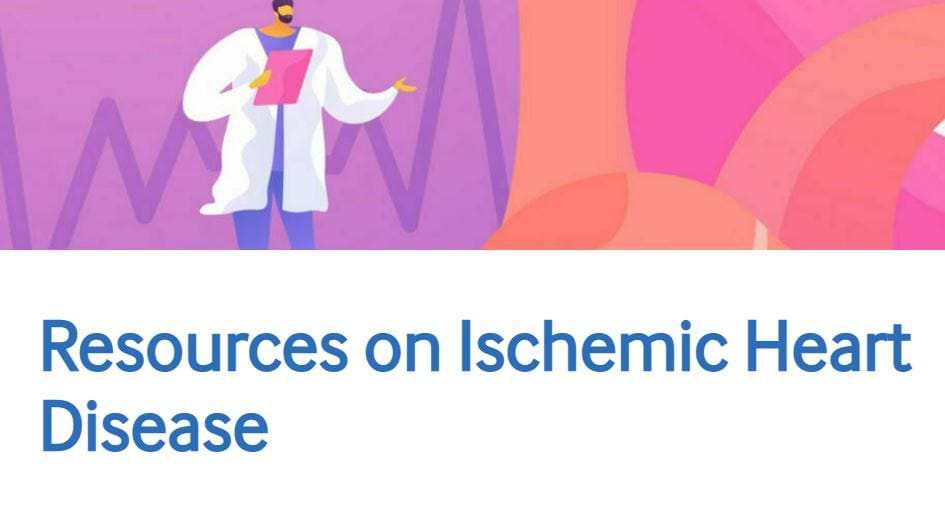 The British Medical Journal (BMJ) has recently launched an online resource to support health care professionals, patients and researchers with important research, best practice information, and online courses on Ischemic Heart Disease. The content is free to access until the end of the year (2021) and can be accessed at: https://www.bmj.com/company/resources-on-Ischemic-heart-disease/
The British Medical Journal (BMJ) has recently launched an online resource to support health care professionals, patients and researchers with important research, best practice information, and online courses on Ischemic Heart Disease. The content is free to access until the end of the year (2021) and can be accessed at: https://www.bmj.com/company/resources-on-Ischemic-heart-disease/ - Year in Cardiology Course
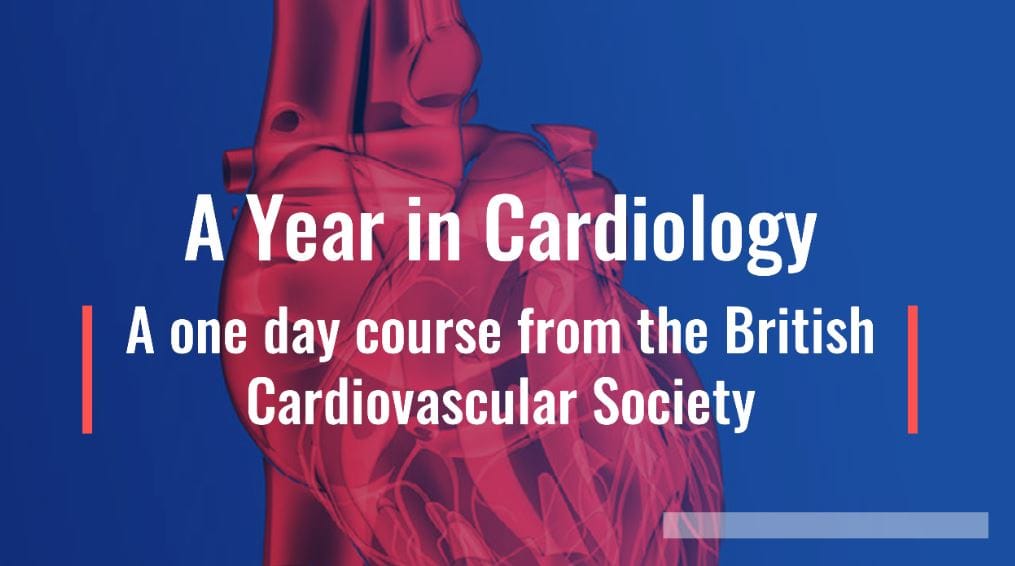 The culmination to the cardiovascular year will review the biggest and most relevant topics of the past 12 months. This course is a must-attend for consultants and cardiology trainees who wish to keep up to date on advances in cardiology. There will also be a live Q&A session posing questions to the expert panel. Date: Friday 10 December, 2021Venue: Royal College of PhysiciansRegistration: Register online now.Fees: BCS Members £ 200 Non-Members £300Online registration closes: Midday Monday 6 December 2021 Find out more and register at https://www.britishcardiovascularsociety.org/education-courses
The culmination to the cardiovascular year will review the biggest and most relevant topics of the past 12 months. This course is a must-attend for consultants and cardiology trainees who wish to keep up to date on advances in cardiology. There will also be a live Q&A session posing questions to the expert panel. Date: Friday 10 December, 2021Venue: Royal College of PhysiciansRegistration: Register online now.Fees: BCS Members £ 200 Non-Members £300Online registration closes: Midday Monday 6 December 2021 Find out more and register at https://www.britishcardiovascularsociety.org/education-courses - Inequalities in Health Alliance calls on Prime Minister to reduce health inequalities.
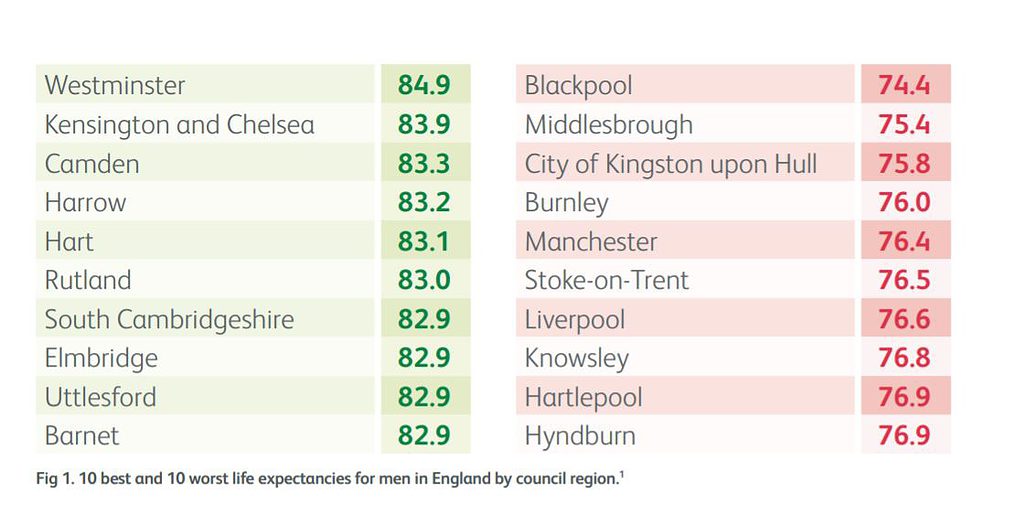 92 senior representatives of the Inequalities in Health Alliance (IHA) have written to the Prime Minister calling for a cross-government strategy to reduce health inequalities. The letter makes calls for a cross-government health inequalities strategy with clear measurable goals, that consider the role of every department and every available policy lever. Health inequality was a problem before COVID-19 – with a gap in healthy life expectancy between the richest and poorest areas of around 19 years – but the pandemic has tragically demonstrated how these inequalities can … Read more
92 senior representatives of the Inequalities in Health Alliance (IHA) have written to the Prime Minister calling for a cross-government strategy to reduce health inequalities. The letter makes calls for a cross-government health inequalities strategy with clear measurable goals, that consider the role of every department and every available policy lever. Health inequality was a problem before COVID-19 – with a gap in healthy life expectancy between the richest and poorest areas of around 19 years – but the pandemic has tragically demonstrated how these inequalities can … Read more - In case you missed it: a summary of the BCS ’21 top 10 trials (Part II)
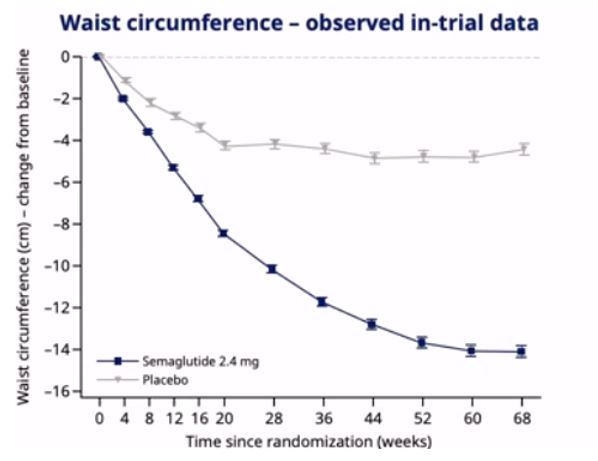 By Ahmed El-Medany One of the most popular sessions every year, an excellent variety of trials were presented at the 2021 BCS Annual Conference. For those that were unable to attend, or for the sake of refreshing one’s memory, the following is a summary of all the trials presented: STEP-1 Presented by Dr. Hussain Contractor, perspective by Dr. Mimi Chen Purpose: Evaluate the efficacy and safety of once-weekly s.c. semaglutide (GLP-1) 2.4mg in people with overweight or obesity, with or without weight-related complications. Study design … Read more
By Ahmed El-Medany One of the most popular sessions every year, an excellent variety of trials were presented at the 2021 BCS Annual Conference. For those that were unable to attend, or for the sake of refreshing one’s memory, the following is a summary of all the trials presented: STEP-1 Presented by Dr. Hussain Contractor, perspective by Dr. Mimi Chen Purpose: Evaluate the efficacy and safety of once-weekly s.c. semaglutide (GLP-1) 2.4mg in people with overweight or obesity, with or without weight-related complications. Study design … Read more - Anticoagulation of Patients with Mechanical Heart Valves.
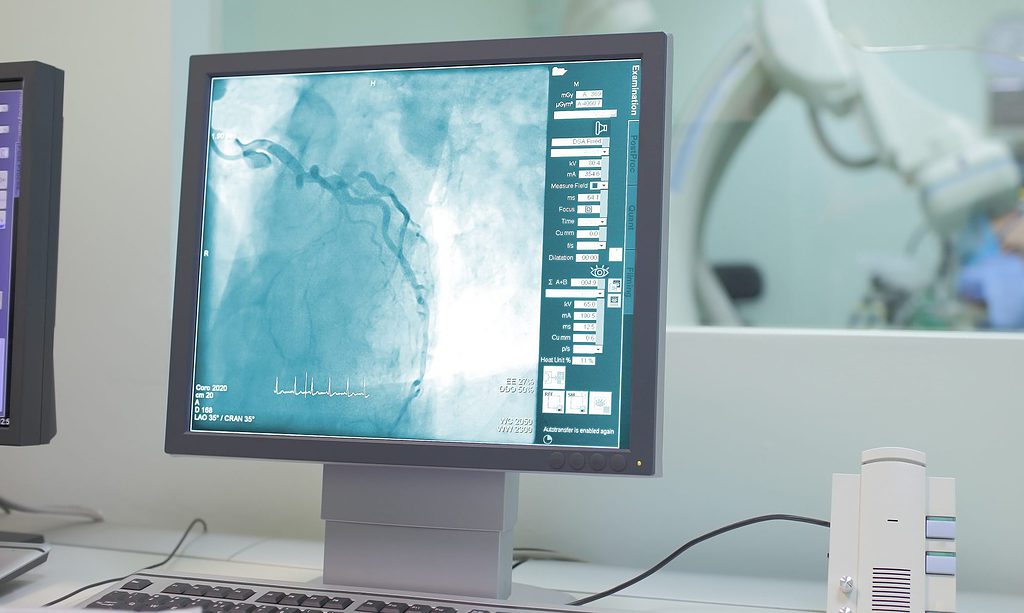 The British Cardiovascular Society (BCS) has today released a Joint Statement together with the British Heart Valve Society (BHVS), the Society for Cardiothoracic Surgeons (SCTS), the British Society of Echocardiography (BSE), the Primary Care Cardiovascular Society (PCCS) and the British Congenital Cardiac Association (BCCA) on Anticoagulation of Patients with Mechanical Heart Valves. On 14 July 2021, a National Patient Safety Alert was issued by NHS England relating to choice of anticoagulant drugs prescribed to patients with mechanical heart valves. [1] This was triggered by cases … Read more
The British Cardiovascular Society (BCS) has today released a Joint Statement together with the British Heart Valve Society (BHVS), the Society for Cardiothoracic Surgeons (SCTS), the British Society of Echocardiography (BSE), the Primary Care Cardiovascular Society (PCCS) and the British Congenital Cardiac Association (BCCA) on Anticoagulation of Patients with Mechanical Heart Valves. On 14 July 2021, a National Patient Safety Alert was issued by NHS England relating to choice of anticoagulant drugs prescribed to patients with mechanical heart valves. [1] This was triggered by cases … Read more - NICE- Atrial Fibrillation Guidelines
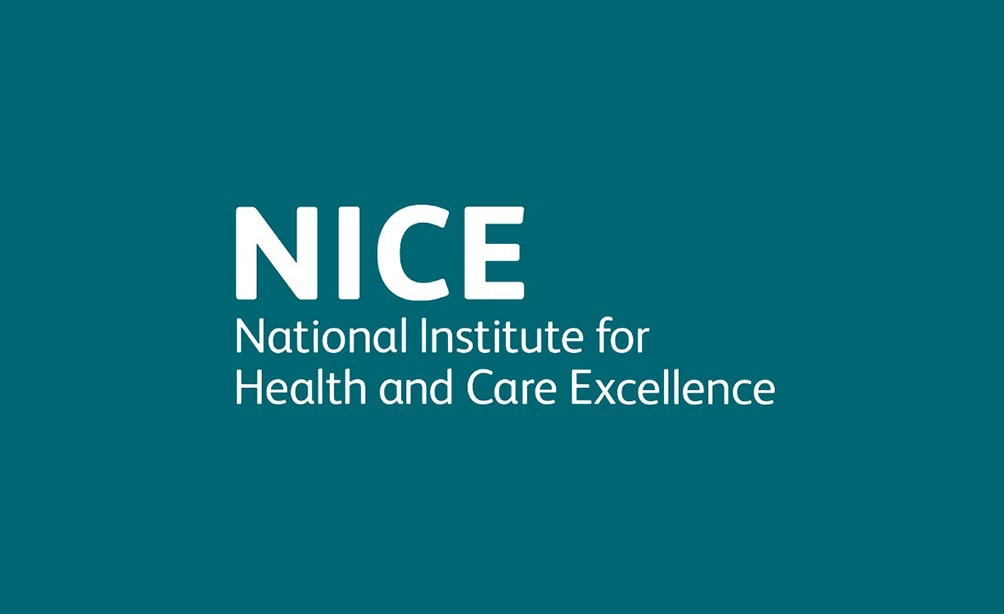 Expert Opinion by: Dr Steve Furniss, Consultant Cardiologist, East Sussex Healthcare Trust
Expert Opinion by: Dr Steve Furniss, Consultant Cardiologist, East Sussex Healthcare Trust - Digital solutions to identify worsening heart failure: TRIAGEHF PLUS
 By Ahmed El-Medany Presented by: Dr Fozia Ahmed, Consultant Cardiologist, Manchester Heart Centre The Digital Innovation in Cardiology session at BCS 2021 was a fascinating and inspiring insight into the technology available in various areas of Cardiology and covered exciting digital prospects for the future. Dr. Ahmed discussed TRIAGEHF PLUS, a risk-based digital heart failure (HF) care pathway, designed to help optimise the care of HF patients with implanted devices. There are currently around 920,000 individuals with HF in the UK, with approximately 200,000 new … Read more
By Ahmed El-Medany Presented by: Dr Fozia Ahmed, Consultant Cardiologist, Manchester Heart Centre The Digital Innovation in Cardiology session at BCS 2021 was a fascinating and inspiring insight into the technology available in various areas of Cardiology and covered exciting digital prospects for the future. Dr. Ahmed discussed TRIAGEHF PLUS, a risk-based digital heart failure (HF) care pathway, designed to help optimise the care of HF patients with implanted devices. There are currently around 920,000 individuals with HF in the UK, with approximately 200,000 new … Read more - Cardiologist Burnout to Clinical Wellness: A mountain to climb but a roadmap to follow
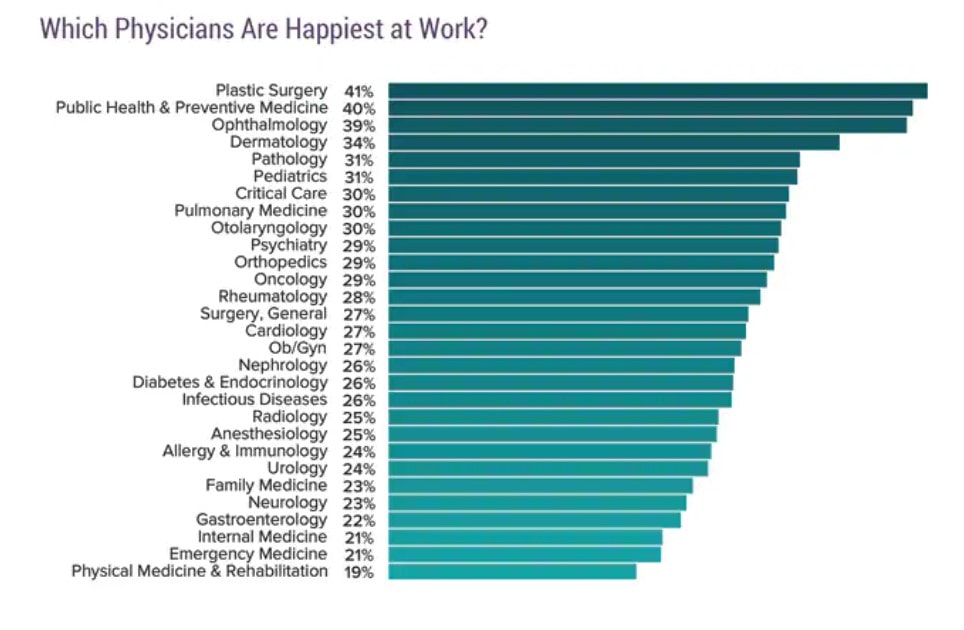 By Guy Lloyd In one of the standout session during BCS 2021, the enormous problem of cardiologist burnout, its causes and consequences as well as potential strategies to address the issue were discussed. In the concluding remarks it was noted that none of the panellists (which included the Presidents of the British Cardiovascular Society (BCS) and Irish Cardiac Society (ICS), the current and past presidents of to American College of Cardiology (ACC) and the Director of Health and Wellbeing for the RCPI) could imagine such … Read more
By Guy Lloyd In one of the standout session during BCS 2021, the enormous problem of cardiologist burnout, its causes and consequences as well as potential strategies to address the issue were discussed. In the concluding remarks it was noted that none of the panellists (which included the Presidents of the British Cardiovascular Society (BCS) and Irish Cardiac Society (ICS), the current and past presidents of to American College of Cardiology (ACC) and the Director of Health and Wellbeing for the RCPI) could imagine such … Read more - Getting the best from the Heart Team: Guidance for the structure and function of cardiac multidisciplinary meetings
 Today the British Cardiovascular Society, together with the Association for Cardiothoracic Anaesthesia and Critical Care, the British Cardiovascular Intervention Society, the British Heart Valve Society and the Society for Cardiothoracic Surgery published a guidance document on the structure and function of cardiac multidisciplinary meetings (MDMs). The purpose of Getting the best from the Heart Team: Guidance for the structure and function of cardiac multidisciplinary meetings is to update the existing joint British Societies recommendations published in 2015 to reflect changes in practice. The documents aim is … Read more
Today the British Cardiovascular Society, together with the Association for Cardiothoracic Anaesthesia and Critical Care, the British Cardiovascular Intervention Society, the British Heart Valve Society and the Society for Cardiothoracic Surgery published a guidance document on the structure and function of cardiac multidisciplinary meetings (MDMs). The purpose of Getting the best from the Heart Team: Guidance for the structure and function of cardiac multidisciplinary meetings is to update the existing joint British Societies recommendations published in 2015 to reflect changes in practice. The documents aim is … Read more - NICE publishes updated clinical guideline on the diagnosis and management of atrial fibrillation
 Key changes: Bleeding risk scoreNew NICE guideline recommends using the ORBIT bleeding risk score but equally recognises that existing bleeding risk scores may still be used as they are embedded in clinical pathways and electronic systems. AnticoagulationDOACs are preferred in patients with atrial fibrillation and a CHA2DS2‑VASc score of 2 or above. Apixaban, dabigatran, edoxaban and rivaroxaban are all recommended as options. However if these are contra-indicated or not tolerated then vitamin K antagonist (VKA) should be offered. However, if patients are established on treatment with … Read more
Key changes: Bleeding risk scoreNew NICE guideline recommends using the ORBIT bleeding risk score but equally recognises that existing bleeding risk scores may still be used as they are embedded in clinical pathways and electronic systems. AnticoagulationDOACs are preferred in patients with atrial fibrillation and a CHA2DS2‑VASc score of 2 or above. Apixaban, dabigatran, edoxaban and rivaroxaban are all recommended as options. However if these are contra-indicated or not tolerated then vitamin K antagonist (VKA) should be offered. However, if patients are established on treatment with … Read more - NICE report on the impact cardiovascular disease management
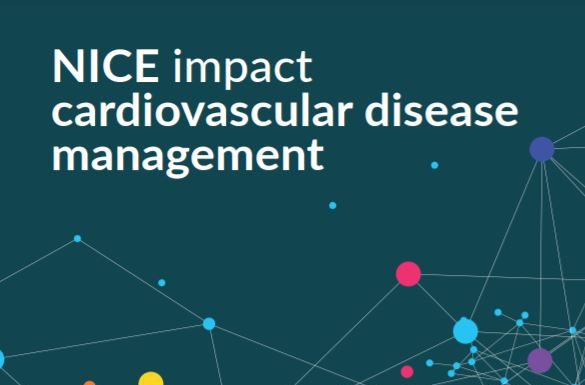 The National Institute for Health and Care Excellence (NICE) has today published a report highlighting progress made by the health and care system in implementing NICE guidance on cardiovascular disease (CVD) management. Alongside the report, Prof Simon Ray, President of the British Cardiovascular Society, provides insights on the key findings about our role in improving outcomes for people with CVD. NHS England’s Long Term Plan suggests that CVD is the main area in which the NHS can save lives over the next 10 years. 6 million people … Read more
The National Institute for Health and Care Excellence (NICE) has today published a report highlighting progress made by the health and care system in implementing NICE guidance on cardiovascular disease (CVD) management. Alongside the report, Prof Simon Ray, President of the British Cardiovascular Society, provides insights on the key findings about our role in improving outcomes for people with CVD. NHS England’s Long Term Plan suggests that CVD is the main area in which the NHS can save lives over the next 10 years. 6 million people … Read more - BCS Review of ESC Clinical Practice Guidelines: 2020
 In 2020, new clinical practice guidelines were published by the European Society of Cardiology. The BCS Clinical Standards Group has reviewed the guidelines and written short summaries with a focus on what is new and any important differences from UK NICE guidance. 2020 ESC Guidelines for:Management of Adult Congenital Heart Disease (ACHD) By Dr Jayant Kakarla These guidelines provide a significant update in the structuring of care, assessment and management of the broad spectrum of pathologies encompassing ACHD. There are no comprehensive national guidelines and … Read more
In 2020, new clinical practice guidelines were published by the European Society of Cardiology. The BCS Clinical Standards Group has reviewed the guidelines and written short summaries with a focus on what is new and any important differences from UK NICE guidance. 2020 ESC Guidelines for:Management of Adult Congenital Heart Disease (ACHD) By Dr Jayant Kakarla These guidelines provide a significant update in the structuring of care, assessment and management of the broad spectrum of pathologies encompassing ACHD. There are no comprehensive national guidelines and … Read more - CaReMe Heart Failure in Adults: Diagnosis & Management Algorithm
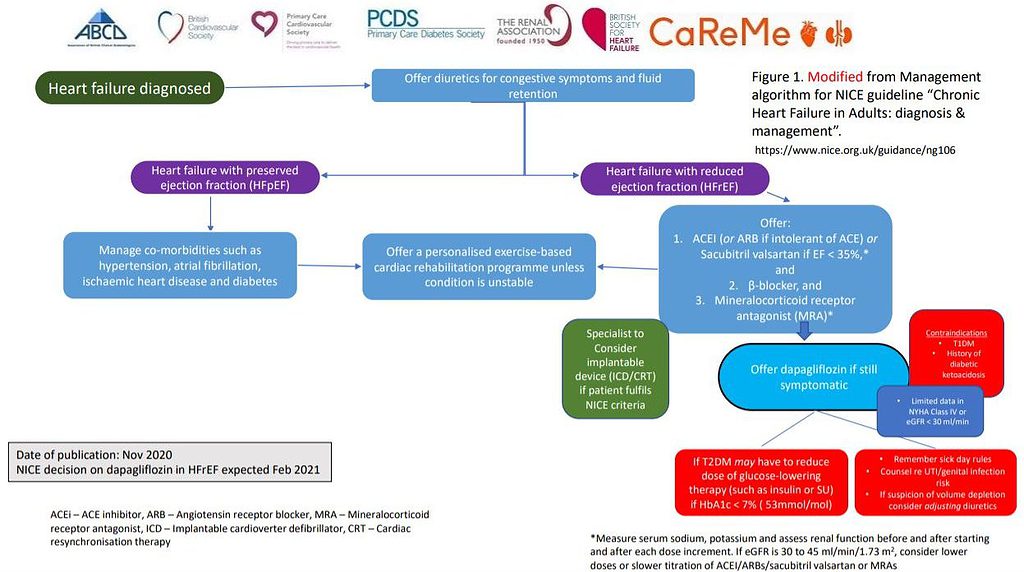 CaReMe has today released the Heart Failure Management Algorithm Modified from: Management algorithm for NICE Guideline “Chronic Heart Failure in Adults: diagnosis & management” https://www.nice.org.uk/guidance/ng106 About CaReMe CaReMe is a collaboration between the British Cardiovascular Society, the Renal Association and the Association of British Clinical Diabetologists. The three professional Societies, along with the Primary Care Cardiovascular Society and the Primary Care Diabetes Society have formed the Cardio-Renal-Metabolic (CaReMe) partnership with the aim of improving the management of patients with diabetes, cardiovascular and renal disease. Find out … Read more
CaReMe has today released the Heart Failure Management Algorithm Modified from: Management algorithm for NICE Guideline “Chronic Heart Failure in Adults: diagnosis & management” https://www.nice.org.uk/guidance/ng106 About CaReMe CaReMe is a collaboration between the British Cardiovascular Society, the Renal Association and the Association of British Clinical Diabetologists. The three professional Societies, along with the Primary Care Cardiovascular Society and the Primary Care Diabetes Society have formed the Cardio-Renal-Metabolic (CaReMe) partnership with the aim of improving the management of patients with diabetes, cardiovascular and renal disease. Find out … Read more - Enhanced Follow Up for Patients with Trifecta Aortic Valve Bioprostheses: A Statement from BHVS, SCTS and BCS
 Statement following a Medical Device Alert issued by the MHRA
Statement following a Medical Device Alert issued by the MHRA - BCS Announcement On The Annual Conference 2021
 Announcement on the staging of the 2021 edition of the BCS Annual Conference
Announcement on the staging of the 2021 edition of the BCS Annual Conference - ESC Congress 2020 – The Digital Experience
 Day Two, as reported by three BCS members in attendance
Day Two, as reported by three BCS members in attendance - Evidence based research on CVD prevention
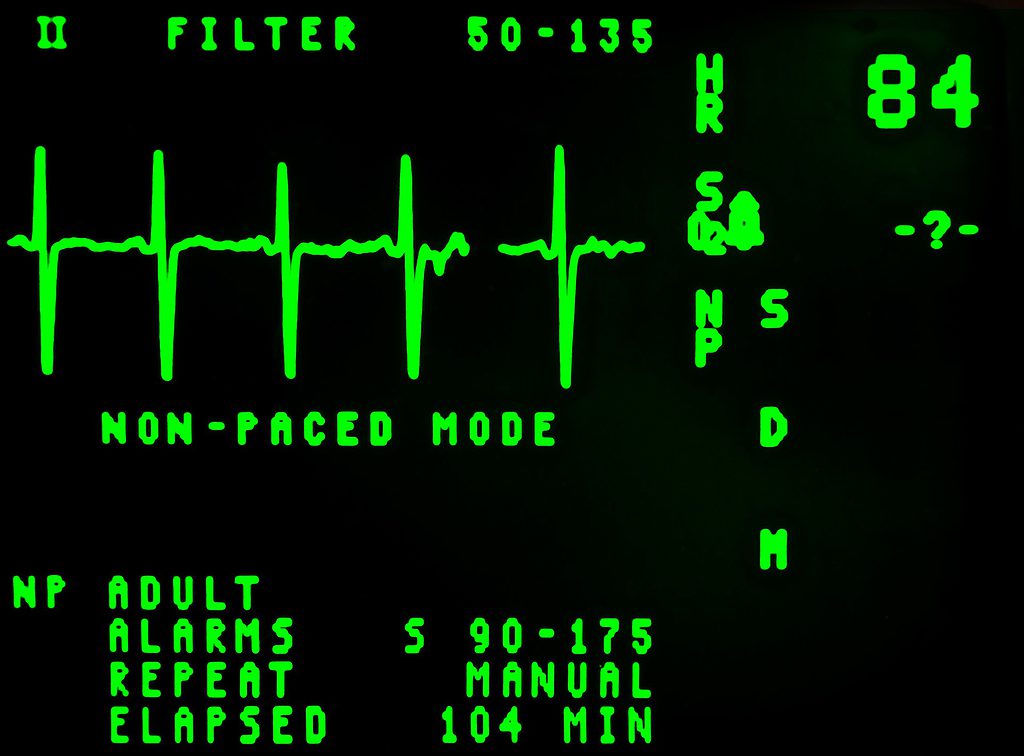 We know that across the world a billion people have high blood pressure and 10.7 million people die each year because of high blood pressure. The tragedy is that so many of these deaths are preventable by prevention, detection and effective treatment of high blood pressure. Saturday 17 October was World Hypertension Day. With CVD being the largest cause of health inequalities, the Long Term Plan prioritises CVD prevention, and sets a minimum ambition of detecting 80% of people with high BP and effectively treating … Read more
We know that across the world a billion people have high blood pressure and 10.7 million people die each year because of high blood pressure. The tragedy is that so many of these deaths are preventable by prevention, detection and effective treatment of high blood pressure. Saturday 17 October was World Hypertension Day. With CVD being the largest cause of health inequalities, the Long Term Plan prioritises CVD prevention, and sets a minimum ambition of detecting 80% of people with high BP and effectively treating … Read more - Cancellation of Cardiac Procedures During COVID-19
 BCS Statement The COVID-19 pandemic has placed immense pressure on the national health service, with frontline hospital services re-organised to handle the surge in cases. This re-organisation has had a wider impact on non-emergency procedures. The British Cardiovascular Society has issued a statement highlighting the (intended or unintended) implications of cancelling cardiac procedures and sets out its recommendation for the interventions that should take priority as the backlog of procedures is addressed. Read the full statement (Unintended but Inevitable) Consequences of Cancellation of Cardiac Procedures … Read more
BCS Statement The COVID-19 pandemic has placed immense pressure on the national health service, with frontline hospital services re-organised to handle the surge in cases. This re-organisation has had a wider impact on non-emergency procedures. The British Cardiovascular Society has issued a statement highlighting the (intended or unintended) implications of cancelling cardiac procedures and sets out its recommendation for the interventions that should take priority as the backlog of procedures is addressed. Read the full statement (Unintended but Inevitable) Consequences of Cancellation of Cardiac Procedures … Read more - ESC Congress 2020 – The Digital Experience
 Day One By Dr Noor Sharrack, Cardiology SpR With public gatherings banned in the Netherlands due to the COVID-19 pandemic, the 2020 edition of the European Society of Cardiology Congress, originally due to take place in Amsterdam, was staged online from 29 August to 1 September. BCS members in attendance share their experience of the first day of this new format. Read the full article… Professor Barbara Casadei nicely opened the conference in her inaugural lecture with a stark reminder of the importance of unity … Read more
Day One By Dr Noor Sharrack, Cardiology SpR With public gatherings banned in the Netherlands due to the COVID-19 pandemic, the 2020 edition of the European Society of Cardiology Congress, originally due to take place in Amsterdam, was staged online from 29 August to 1 September. BCS members in attendance share their experience of the first day of this new format. Read the full article… Professor Barbara Casadei nicely opened the conference in her inaugural lecture with a stark reminder of the importance of unity … Read more - BCS Editorial: Computed Tomography Coronary Angiography in Stable Coronary Heart Disease: The UK Perspective
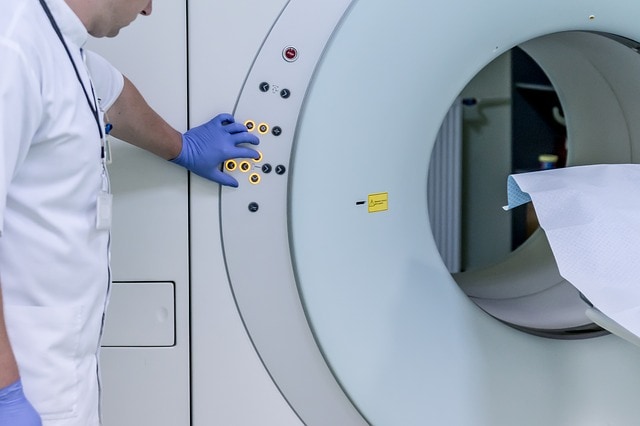 By Kenneth Mangion One in ten of all chest pain presentations to primary care have been reported to be due to coronary heart disease (CHD).(1,2) In the UK, rapid access chest pain clinics have been proven to be an effective way of identifying patients with angina.(3,4) There are a variety of non-invasive tests available for the investigation of patients with stable chest pain including anatomical imaging with CT coronary angiography (CTCA) and functional testing including stress electrocardiography, radionuclide scintigraphy, echocardiography, or magnetic resonance imaging.(5–10) Historically, the mainstay non-invasive … Read more
By Kenneth Mangion One in ten of all chest pain presentations to primary care have been reported to be due to coronary heart disease (CHD).(1,2) In the UK, rapid access chest pain clinics have been proven to be an effective way of identifying patients with angina.(3,4) There are a variety of non-invasive tests available for the investigation of patients with stable chest pain including anatomical imaging with CT coronary angiography (CTCA) and functional testing including stress electrocardiography, radionuclide scintigraphy, echocardiography, or magnetic resonance imaging.(5–10) Historically, the mainstay non-invasive … Read more
